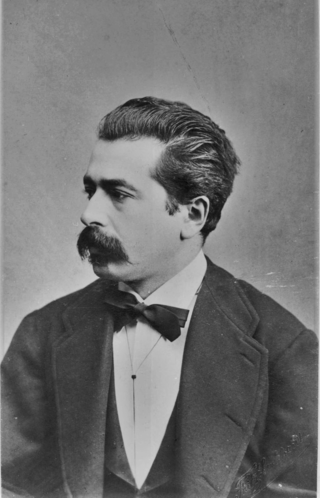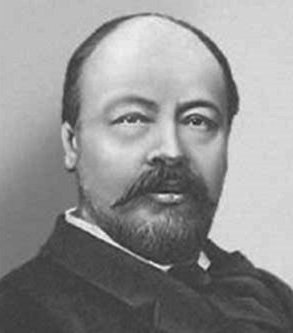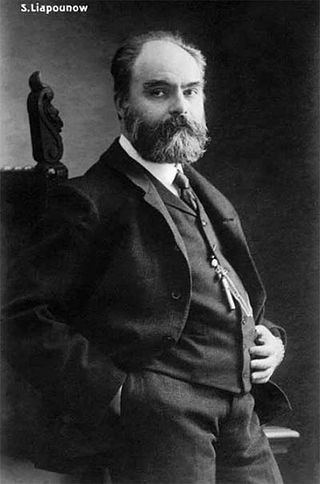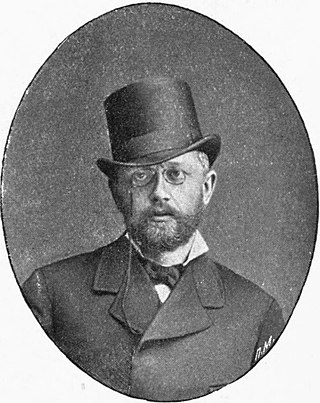
Souvenir de Hapsal, Op. 2, is a suite of three pieces for piano by Pyotr Ilyich Tchaikovsky. It was his first cycle of piano pieces and it was composed in 1867. [1]

Souvenir de Hapsal, Op. 2, is a suite of three pieces for piano by Pyotr Ilyich Tchaikovsky. It was his first cycle of piano pieces and it was composed in 1867. [1]
The Souvenir de Hapsal was written during Tchaikovsky's stay in Hapsal, then in the Russian Empire (it is now Haapsalu in Estonia). He stayed there with his brothers Modest and Anatoly Tchaikovsky as well as members of the Davydov family. He dedicated this work to Vera Davydova. [1]

Souvenir de Hapsal consists of three pieces for the piano: [3]
The Scherzo was first performed by Nikolai Rubinstein on 27 February 1868.
The conductor Max Erdmannsdörfer orchestrated Chant sans paroles, which pleased Tchaikovsky so much that he conducted it himself. [4]
This article is about music-related events in 1867.

Henri François Joseph Vieuxtemps was a Belgian composer and violinist. He occupies an important place in the history of the violin as a prominent exponent of the Franco-Belgian violin school during the mid-19th century. He is also known for playing what is now known as the Vieuxtemps Guarneri del Gesù, a violin of superior workmanship.

Joseph Joachim Raff was a German-Swiss composer, pedagogue and pianist.

Karl Yulievich Davydov was a Russian cellist, described by Pyotr Ilyich Tchaikovsky as the "czar of cellists". He was also a composer, mainly for the cello. His name also appears in various different spellings: Davydov, Davidoff, Davidov, and more, with his first name sometimes written as Charles or Carl.

Henryk Wieniawski was a Polish virtuoso violinist, composer and pedagogue, who is regarded amongst the most distinguished violinists in history. His younger brother Józef Wieniawski and nephew Adam Tadeusz Wieniawski were also accomplished musicians, as was his daughter Régine, who became a naturalised British subject upon marrying into the peerage and wrote music under the name Poldowski.

Anatoly Konstantinovich Lyadov was a Russian composer, teacher and conductor.

Sergei Mikhailovich Lyapunov was a Russian composer, pianist and conductor.

Georg Martin Adolf von Henselt was a German composer and virtuoso pianist.
Georgy Lvovich Catoire was a Russian composer of French heritage.

Pyotr Ilyich Tchaikovsky wrote his Symphony No. 1 in G minor, Winter Daydreams , Op. 13, in 1866, just after he accepted a professorship at the Moscow Conservatory: it is the composer's earliest notable work. The composer's brother Modest claimed this work cost Tchaikovsky more labor and suffering than any of his other works. Even so, he remained fond of it, writing to his patroness Nadezhda von Meck in 1883 that "although it is in many ways very immature, yet fundamentally it has more substance and is better than any of my other more mature works." He dedicated the symphony to Nikolai Rubinstein.
Piano Pieces is a ballet choreographed by Jerome Robbins to music by Pyotr Ilyich Tchaikovsky. The ballet was made for New York City Ballet's Tchaikovsky Festival, and premiered on June 11, 1981, at the New York State Theater.
Pyotr Ilyich Tchaikovsky composed his Orchestral Suite No. 3 in G, Op. 55 in 1884, writing it concurrently with his Concert Fantasia in G, Op. 56, for piano and orchestra. The originally intended opening movement of the suite, Contrastes, instead became the closing movement of the fantasia. Both works were also intended initially as more mainstream compositions than they became; the fantasia was intended as a piano concerto, while the suite was conceived as a symphony.
Pyotr Ilyich Tchaikovsky composed his Orchestral Suite No. 2 in C major, Op. 53, in 1883. It was premiered on February 16, 1884 at a Russian Musical Society concert in Moscow, conducted by Max Erdmannsdörfer. The piece was well enough received to be repeated a week later. It is dedicated to his brother Anatoly's wife, Praskovya Vladimirovna Tchaikovskaya.

Max Erdmannsdörfer was a German conductor, pianist and composer.

Souvenir d'un lieu cher, Op. 42, is a set of three pieces for violin and piano, written by Pyotr Ilyich Tchaikovsky in 1878.
Clément Loret was an organist, music educator, and composer of Belgian origin, French naturalized.